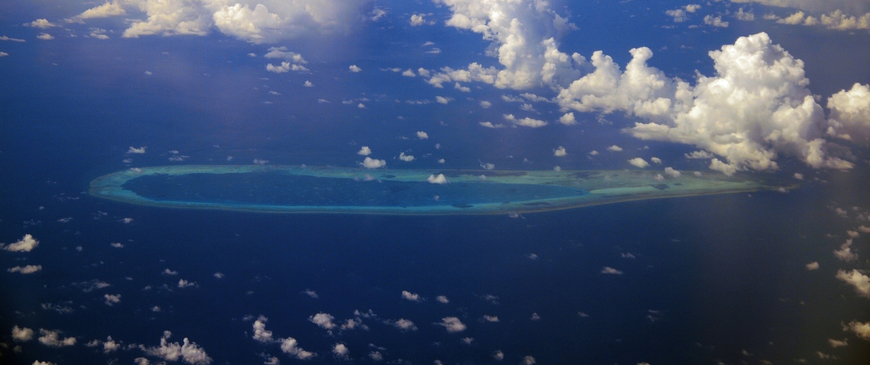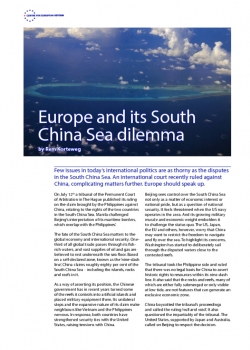
Europe and its South China Sea dilemma
Few issues in today’s international politics are as thorny as the disputes in the South China Sea. An international court recently ruled against China, complicating matters further. Europe should speak up.
On July 12th a tribunal of the Permanent Court of Arbitration in The Hague published its ruling on the claim brought by the Philippines against China, relating to the rights of the two countries in the South China Sea. Manila had challenged Beijing’s interpretation of its maritime borders, which overlap with the Philippines’.
The fate of the South China Sea matters to the global economy and international security. One-third of all global trade passes through its fish-rich waters, and vast supplies of oil and gas are believed to rest underneath the sea floor. Based on a self-declared zone, known as the ‘nine-dash line’, China claims roughly eighty per cent of the South China Sea – including the islands, rocks and reefs in it.
As a way of asserting its position, the Chinese government has in recent years turned some of the reefs it controls into artificial islands and placed military equipment there. Its unilateral steps and the expansive nature of its claim make neighbours like Vietnam and the Philippines nervous. In response, both countries have strengthened security ties with the United States, raising tensions with China.
Beijing sees control over the South China Sea not only as a matter of economic interest or national pride, but as a question of national security. It feels threatened when the US navy operates in the area. And its growing military muscle and economic weight embolden it to challenge the status quo. The US, Japan, the EU and others, however, worry that China may want to restrict the freedom to navigate and fly over the sea. To highlight its concerns, Washington has started to deliberately sail through the disputed waters close to the contested reefs.
The tribunal took the Philippine side and ruled that there was no legal basis for China to assert historic rights to resources within its nine-dash line. It also said that the rocks and reefs, many of which are either fully submerged or only visible at low tide, are not features that can generate an exclusive economic zone.
China boycotted the tribunal’s proceedings and called the ruling ‘null and void’. It also questioned the impartiality of the tribunal. The United States, supported by Japan and Australia, called on Beijing to respect the decision.
As for the EU, when the tribunal ruled on the case, it was still shell-shocked by the result of the Brexit vote two weeks earlier. China also successfully leveraged its economic ties to some Central and South-eastern European member-states – including Hungary and Greece – to block a strong statement in support of the ruling. For its part, the Commission was wary of condemning China, perhaps for fear that this could hit Chinese investment in Europe. The result was a weak statement, in which the EU merely ‘acknowledged’ the ruling.
Instead of resolving the issue, the court’s decision complicates matters. Beijing will not accept the verdict; to do so would mean a loss of face. The ruling has handed the Philippines a handsome diplomatic victory, though Manila knows it could never enforce it. It is a military pygmy compared to China. The case was brought by the previous Philippine president, Benigno Aquino III; his successor, Rodrigo Duterte, has struck a more conciliatory tone with the Chinese. And Beijing seemingly hopes to avoid further confrontation on the issue by opening bilateral trade talks with Manila.
Through a mixture of buying off and bullying, China may ultimately get its way in the South China Sea. This may avoid conflict for now, but it would set a bad precedent. Where international law takes a step back, great power confrontation comes a step closer.
Because the United States is now the most vocal in calling on Beijing to respect the court’s decision, and the EU has avoided taking sides, the Chinese government could draw the conclusion that international law is an American tool. As a result, China may be even less willing to accept international legal rulings in the future. At stake is the UN Convention on the Law of the Sea (UNCLOS) and, more broadly, the international rule of law.
The rule of law is a necessary precondition to avoid a state of anarchy where the ‘strong do what they can, and the weak suffer what they must’. Support for it cannot be voluntary or selective; it should apply equally everywhere. The EU should speak up. In Ukraine, Europe has witnessed the unpicking of international law close to home. If an UNCLOS ruling can be disregarded in Asia, why not also in the Black Sea or the Arctic?
Europe must not underestimate its own role: because it is not a party to the South China Sea disputes and does not guarantee the security of any of the states involved, it can put forward the neutral case in favour of international law. Europe should work to convince the Chinese to engage with the case. If Beijing does not like the tribunal’s findings, let it appeal them, not dismiss them.
Rem Korteweg is a senior research fellow at the Centre for European Reform.

